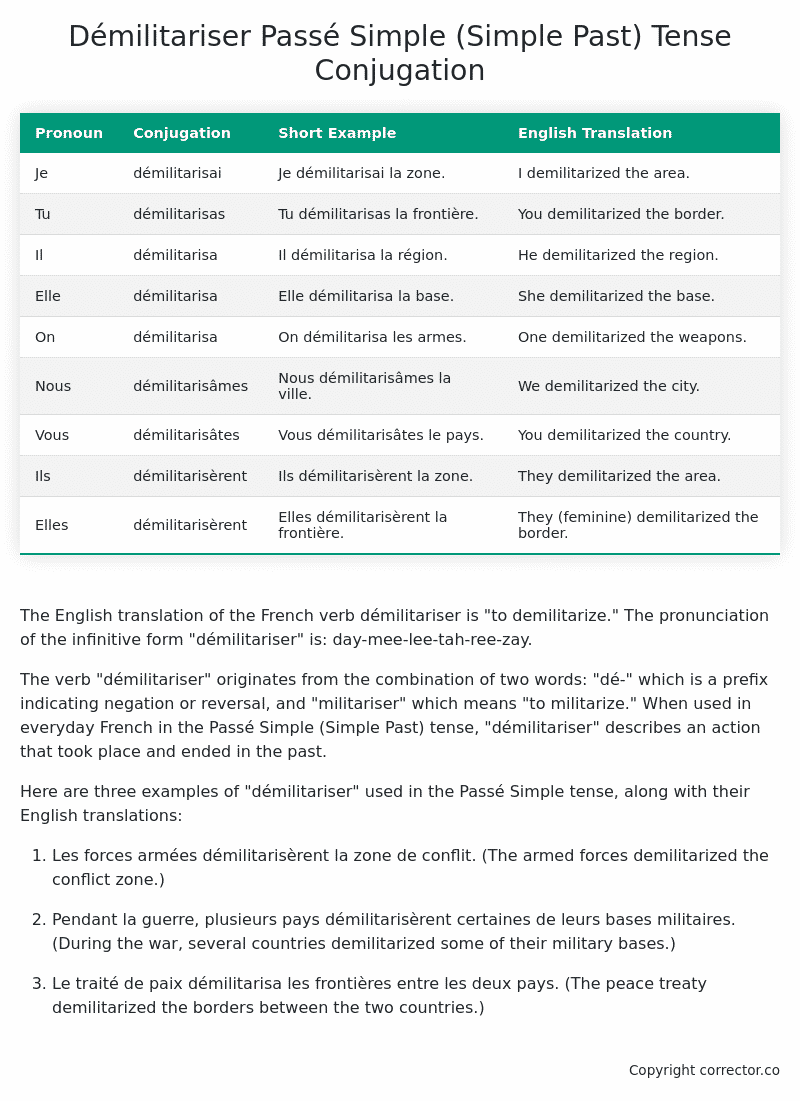Passé Simple (Simple Past) Tense Conjugation of the French Verb démilitariser
Introduction to the verb démilitariser
The English translation of the French verb démilitariser is “to demilitarize.” The pronunciation of the infinitive form “démilitariser” is: day-mee-lee-tah-ree-zay.
The verb “démilitariser” originates from the combination of two words: “dé-” which is a prefix indicating negation or reversal, and “militariser” which means “to militarize.” When used in everyday French in the Passé Simple (Simple Past) tense, “démilitariser” describes an action that took place and ended in the past.
Here are three examples of “démilitariser” used in the Passé Simple tense, along with their English translations:
-
Les forces armées démilitarisèrent la zone de conflit.
(The armed forces demilitarized the conflict zone.) -
Pendant la guerre, plusieurs pays démilitarisèrent certaines de leurs bases militaires.
(During the war, several countries demilitarized some of their military bases.) -
Le traité de paix démilitarisa les frontières entre les deux pays.
(The peace treaty demilitarized the borders between the two countries.)
Table of the Passé Simple (Simple Past) Tense Conjugation of démilitariser
| Pronoun | Conjugation | Short Example | English Translation |
|---|---|---|---|
| Je | démilitarisai | Je démilitarisai la zone. | I demilitarized the area. |
| Tu | démilitarisas | Tu démilitarisas la frontière. | You demilitarized the border. |
| Il | démilitarisa | Il démilitarisa la région. | He demilitarized the region. |
| Elle | démilitarisa | Elle démilitarisa la base. | She demilitarized the base. |
| On | démilitarisa | On démilitarisa les armes. | One demilitarized the weapons. |
| Nous | démilitarisâmes | Nous démilitarisâmes la ville. | We demilitarized the city. |
| Vous | démilitarisâtes | Vous démilitarisâtes le pays. | You demilitarized the country. |
| Ils | démilitarisèrent | Ils démilitarisèrent la zone. | They demilitarized the area. |
| Elles | démilitarisèrent | Elles démilitarisèrent la frontière. | They (feminine) demilitarized the border. |
Other Conjugations for Démilitariser.
Le Present (Present Tense) Conjugation of the French Verb démilitariser
Imparfait (Imperfect) Tense Conjugation of the French Verb démilitariser
Passé Simple (Simple Past) Tense Conjugation of the French Verb démilitariser (You’re reading it right now!)
Passé Composé (Present Perfect) Tense Conjugation of the French Verb démilitariser
Futur Simple (Simple Future) Tense Conjugation of the French Verb démilitariser
Futur Proche (Near Future) Tense Conjugation of the French Verb démilitariser
Plus-que-parfait (Pluperfect) Tense Conjugation of the French Verb démilitariser
Passé Antérieur (Past Anterior) Tense Conjugation of the French Verb démilitariser
Futur Antérieur (Future Anterior) Tense Conjugation of the French Verb démilitariser
Subjonctif Présent (Subjunctive Present) Tense Conjugation of the French Verb démilitariser
Subjonctif Passé (Subjunctive Past) Tense Conjugation of the French Verb démilitariser
Subjonctif Imparfait (Subjunctive Imperfect) Tense Conjugation of the French Verb démilitariser
Conditionnel Présent (Conditional Present) Tense Conjugation of the French Verb démilitariser
Conditionnel Passé (Conditional Past) Tense Conjugation of the French Verb démilitariser
Conditionnel Passé II (Conditional Past II) Tense Conjugation of the French Verb démilitariser
L’impératif Présent (Imperative Present) Tense Conjugation of the French Verb démilitariser
L’impératif Passé (Imperative Past) Tense Conjugation of the French Verb démilitariser
L’infinitif Présent (Infinitive Present) Tense Conjugation of the French Verb démilitariser
L’infinitif Passé (Infinitive Past) Tense Conjugation of the French Verb démilitariser
Le Participe Présent (Present Participle) Tense Conjugation of the French Verb démilitariser
Le Participe Passé (Past Participle) Tense Conjugation of the French Verb démilitariser
Struggling with French verbs or the language in general? Why not use our free French Grammar Checker – no registration required!
Get a FREE Download Study Sheet of this Conjugation 🔥
Simply right click the image below, click “save image” and get your free reference for the démilitariser Passé Simple tense conjugation!

Démilitariser – About the French Passé Simple (Simple Past) Tense
Formation
Usage
Narration
Historical Context
Interactions with other tenses
Passé Composé
Imparfait
Conditional and Subjunctive
Summary
I hope you enjoyed this article on the verb démilitariser. Still in a learning mood? Check out another TOTALLY random French verb conjugation!


